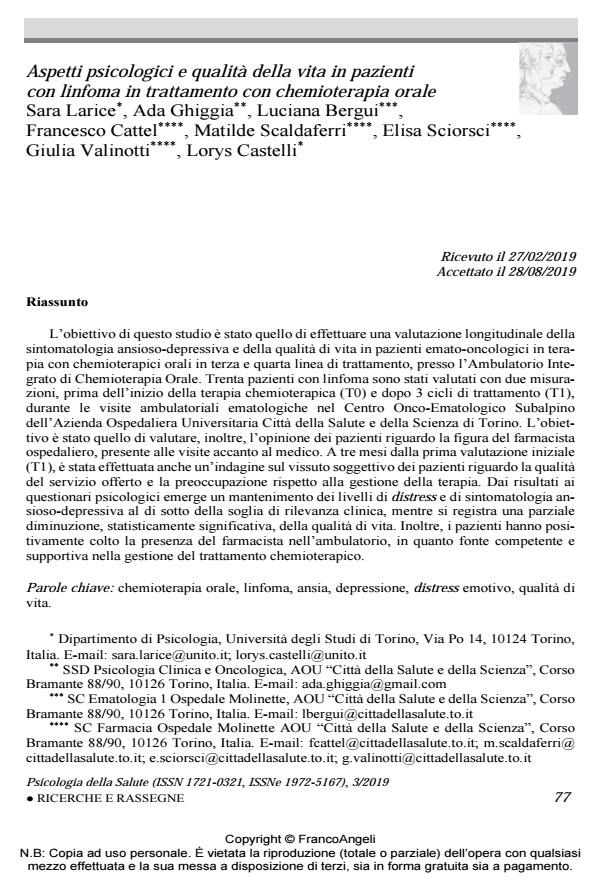Psychological factors and quality of life in lymphoma patients treated with oral chemotherapy
Journal title PSICOLOGIA DELLA SALUTE
Author/s Sara Larice, Ada Ghiggia, Luciana Bergui, Francesco Cattel, Matilde Scaldaferri, Elisa Sciorsci, Giulia Valinotti, Lorys Castelli
Publishing Year 2019 Issue 2019/3
Language Italian Pages 21 P. 77-97 File size 299 KB
DOI 10.3280/PDS2019-003005
DOI is like a bar code for intellectual property: to have more infomation
click here
Below, you can see the article first page
If you want to buy this article in PDF format, you can do it, following the instructions to buy download credits

FrancoAngeli is member of Publishers International Linking Association, Inc (PILA), a not-for-profit association which run the CrossRef service enabling links to and from online scholarly content.
The aim of the study was to carry out a longitudinal evaluation of anxious-depressive symptomatology and quality of life in onco-hematological patients in treatment with oral chemotherapies. The project was conducted at the Integrated Oral Chemotherapy Service, in the Subalpine Onco-Hematological Center of the "Città della Salute e della Scienza" University Hospital of Turin. Thirty patients with lymphoma were evaluated with three measurements on psychological distress (Hospital Anxiety and Depression Scale HADS and the Distress Thermometer - DT) and quality of life (Functional Assessment of Cancer Therapy Scale-General, FACT-G). The psychological assessment was taken at the start of chemotherapy (T0) and after 3 cycles of treatment (T1), during outpatient hematological visits. A secondary aim was to evaluate the subjective patients’ opinion about the quality of the service and the level of concern about the therapy’s management, only at T1. Results of the psychological questionnaires showed the maintenance of distress and anxious-depressive symptomatology levels be-low the threshold of clinical relevance. Regarding the quality of life, our data showed a statistically significant decrease on the total score. What is more, patients have positively evaluated the presence of the pharmacist in the clinic, as a competent and supportive figure for the man-agement of chemotherapy treatment.
Keywords: Oral chemotherapy, lymphoma, anxiety, depression, emotional distress, quality of life
Sara Larice, Ada Ghiggia, Luciana Bergui, Francesco Cattel, Matilde Scaldaferri, Elisa Sciorsci, Giulia Valinotti, Lorys Castelli, Aspetti psicologici e qualità della vita in pazienti con linfoma in trattamento con chemioterapia orale in "PSICOLOGIA DELLA SALUTE" 3/2019, pp 77-97, DOI: 10.3280/PDS2019-003005